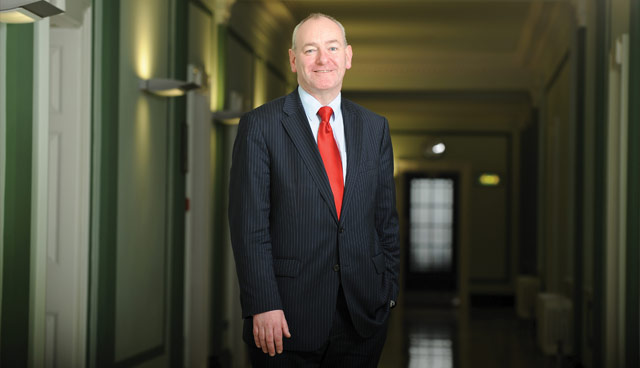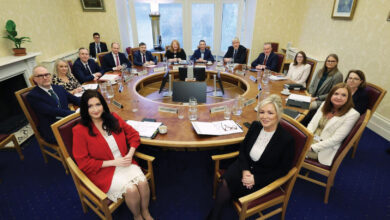Durkan stands for Fine Gael in Dublin

Former deputy First Minister Mark Durkan shocked everyone, not least his own SDLP, of which he was leader from 2001-2010, when he announced his intention to contest the European elections in Dublin as a Fine Gael candidate. The move is the latest example of southern parties looking north in the Brexit-dominated political landscape as calls for a border poll grow louder.
In an interview with the Derry Journal shortly after announcing his candidacy, Durkan revealed that he had only spoken to SDLP leader Colum Eastwood on the day of the announcement and had informed him of his decision hours beforehand. This was, Durkan said, because he knew that Eastwood, who was in negotiations with Fianna Fáil over a partnership with the SDLP, would be duty-bound to inform Fianna Fáil of Durkan’s candidature.
In the wake of the partnership, Taoiseach and Fine Gael leader Leo Varadkar said that he hoped his party’s relationship with the SDLP would not be damaged and the move to secure Durkan and a reported rebuffed attempt at poaching MLA Claire Hanna, also for the European elections, would seem to be Varadkar’s attempt to ensure that relationship remains intact.
Recognised for his work as a party strategist, particularly as a key architect of the Good Friday Agreement, Durkan has previously been on record warning the SDLP against aligning itself with just one of the Republic of Ireland’s main parties. He has claimed that it is a positive reflection on the SDLP that both Fine Gael and Fianna Fáil have turned to it when looking north post-Brexit. At the SDLP conference in Newry in February 2019, where the Fianna Fáil partnership was ratified by voting members, 53 members voted to broaden the agreement to include Fine Gael and the Irish Labour Party.
Durkan will run alongside former Tánaiste, Frances Fitzgerald TD, in the Dublin constituency, in a race where two incumbents are vacating their seats. Independent MEP Nessa Childers, who is a member of the SDLP’s European umbrella group, the Party of European Socialists, and Fine Gael MEP Brian Hayes are both vacating seats in a constituency in which Fine Gael have never held two seats simultaneously. Sinn Féin MEP Lynn Boylan is the only incumbent contesting as the constituency, a three-seater since 2009, returns to four seats. The constituency, going back to its founding in 1979, has returned one seat for Fine Gael at every election. At the announcement of his candidature, Durkan said that he hoped that 24 May would be a “green jersey day with a strong turnout to send a message to Brexiteers that the Irish people as a whole value the EU in a fundamental way”.
Durkan has said that he plans to continue living in Northern Ireland if elected and that he is running on the hope of representing all of Ireland post-Brexit. As an architect of the GFA, Durkan has been consistent since its implementation in calling for serious planning for a united Ireland, which he has stressed would not necessitate the abandonment of the agreement. In detailing his vision of an “agreed Ireland”, Durkan told agendaNi in December 2018 that, in the event of a united Ireland, the Stormont Assembly would not be dissolved, rather the “envelope of devolution” would be passed from Westminster to Dublin.
The decision to join Fine Gael when running in southern elections does have a precedent in the SDLP, with party founder Austin Currie having served as a Fine Gael TD from 1989-2002 and Minister of State for Justice from 1994-1997. Durkan said that he had received the blessing of Pat Hume, wife of John Hume, and that his decision to run for Fine Gael, whose government is supported by Fianna Fáil in a confidence and supply agreement, does not mean that he has turned his back on the SDLP, although he has suspended his party membership.





